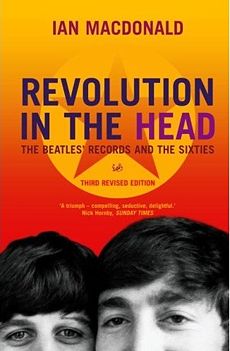Difference between revisions of "Revolution in the Head"
From Beatles Wiki - Interviews, Music, Beatles Quotes
(Created page for Revolution in the Head) |
(Synopsis section added.) |
||
| Line 16: | Line 16: | ||
'''Synopsis''' | '''Synopsis''' | ||
| + | |||
| + | This book hit the mid-1990s pop-cultural scene like a bolt from the blue. Well over a quarter of a century since they was Fab, it might have seemed that everything worth saying about the Beatles had already been said, several times. At that stage, the suggestion that someone could produce a genuinely fresh perspective on this most catergorised, analysed, and anthologised of pop groups seemed only marginally less unlikely than the idea that a new band might emerge from the pop field whose music could hold a candle to the imperviously incomparable legacy of the world's best-loved Liverpudlians. | ||
| + | |||
| + | But MacDonald's words leap off the page with a freshness and sense of excitment reminiscent of, say, the opening seconds of 'I Want to Hold Your Hand'. A chronological song-by-song analysis of the Beatles' output, 'Revolution in the Head' manages to make that rarest of leaps: to transcend merely being an excellent study of its subject, and instead emerge as a worthwhile cultural artefact in its own right. Scholarly yet irreverent, highly serious but always richly entertaining, the book not only sends the reader back to the music it describes, but also repays repeated readings. | ||
| + | |||
| + | The worth, and impact, of Macdonald's work was summarised by UK newspaper The Guardian: | ||
| + | |||
| + | <blockquote> | ||
| + | <p>In his book Revolution In The Head, first published in 1994, MacDonald carefully anatomised every record the Beatles made, drawing attention to broad themes, particular examples of inspiration and moments of human frailty alike. </p> | ||
| + | |||
| + | <p>What could have been a dry task instead produced a volume so engagingly readable, so fresh in its perceptions and so enjoyable to argue with that, in an already overcrowded field, it became an immediate hit. Without a hint of sycophancy, MacDonald had managed to describe the magic created by John Lennon, Paul McCartney, George Harrison and Ringo Starr in such a way as to reacquaint those who were around at the time with their own original enthusiasm, while alerting listeners of later generations to the precise qualities that had made the Beatles so exceptional. Its introduction alone provides something close to a definitive evocation of the factors that turned the 1960s into 'the sixties'. </p> | ||
| + | </blockquote> | ||
| + | |||
| + | |||
Revision as of 04:23, 20 May 2009
Synopsis
This book hit the mid-1990s pop-cultural scene like a bolt from the blue. Well over a quarter of a century since they was Fab, it might have seemed that everything worth saying about the Beatles had already been said, several times. At that stage, the suggestion that someone could produce a genuinely fresh perspective on this most catergorised, analysed, and anthologised of pop groups seemed only marginally less unlikely than the idea that a new band might emerge from the pop field whose music could hold a candle to the imperviously incomparable legacy of the world's best-loved Liverpudlians.
But MacDonald's words leap off the page with a freshness and sense of excitment reminiscent of, say, the opening seconds of 'I Want to Hold Your Hand'. A chronological song-by-song analysis of the Beatles' output, 'Revolution in the Head' manages to make that rarest of leaps: to transcend merely being an excellent study of its subject, and instead emerge as a worthwhile cultural artefact in its own right. Scholarly yet irreverent, highly serious but always richly entertaining, the book not only sends the reader back to the music it describes, but also repays repeated readings.
The worth, and impact, of Macdonald's work was summarised by UK newspaper The Guardian:
In his book Revolution In The Head, first published in 1994, MacDonald carefully anatomised every record the Beatles made, drawing attention to broad themes, particular examples of inspiration and moments of human frailty alike.
What could have been a dry task instead produced a volume so engagingly readable, so fresh in its perceptions and so enjoyable to argue with that, in an already overcrowded field, it became an immediate hit. Without a hint of sycophancy, MacDonald had managed to describe the magic created by John Lennon, Paul McCartney, George Harrison and Ringo Starr in such a way as to reacquaint those who were around at the time with their own original enthusiasm, while alerting listeners of later generations to the precise qualities that had made the Beatles so exceptional. Its introduction alone provides something close to a definitive evocation of the factors that turned the 1960s into 'the sixties'.
Focus
Structure
Style
Content
Criticism
Editions
References
